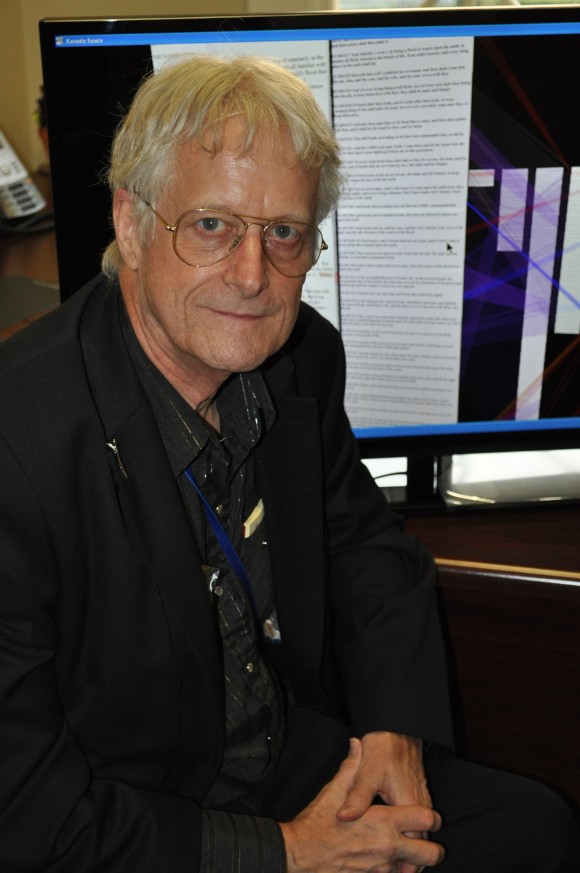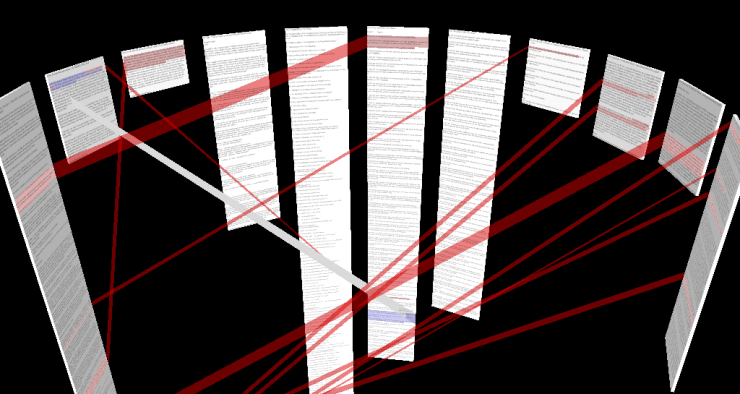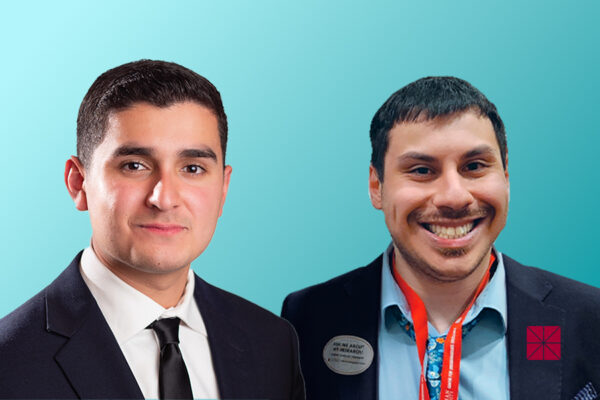After five decades, computer pioneer Ted Nelson remains committed to his singular vision for a better system.

In his Chapman University office, Ted Nelson displays Project Xanadu, which has evolved considerably since its founding in 1960 but still reflects his vision for linking information and ideas.
More than anything, Ted Nelson wants you to know that he’s not giving up. Not by a long shot.
“My first priority is to give the human race a decent document system,” said Nelson, 76, a pioneer of computing. “It’s a continuing astonishment that people accept what we have.”
In Nelson’s estimation, what we have is a misshapen computer existence ruled by the likes of Microsoft, Apple and the World Wide Web. For five decades, he’s been trying to illuminate a better way.
“I hate both Microsoft and Apple operating systems,” said Nelson, Ph.D., during an interview in his Chapman University office after giving the final exam for the computer science class he
taught this fall.
“I still intend to get my designs running, so you can at last have a real choice,” Nelson noted in his autobiography
Possiplex: Movies, Intellect, Creative Control, My Computer Life and the Fight for Civilization
.
The son of Emmy-winning director Ralph Nelson and Oscar-winning actress Celeste Holm, Nelson was raised by his maternal grandparents and first started fighting for his unique vision as a teenager. A philosophy major at Swarthmore College, he developed his own theory of psychology, and at 22, he directed an experimental film,
The Epiphany of Slocum Furlow
, that still generates interest.
But it’s his groundbreaking work advancing information technology that secures Nelson’s place in history. Along the way, he coined the terms hypertext and hypermedia, as well as transclusion, virtuality and intertwingularity. “He also rubbed people the wrong way a whole lot,” Nelson admits. “I am impatient with people not getting things.”
As Nelson’s autobiography indicates, he’s a certified iconoclast. He chose as its cover his ID photo from a hacker conference, saying that it shows “the author as he wishes to be remembered: clever, determined, defiant.”
Add to that list: brilliant, innovative and unconventional. But not resentful, even though some of his key ideas, including his Xanadu operating system, still lack the wide acceptance he has long pursued.
“I’m much less bitter than I used to be,” he said. “I have a lovely wife who has mellowed me, you might say.”
When he founded Project Xanadu in 1960, Nelson envisioned it as the basis for worldwide system. He was brash enough to design “the documents of the future, and indeed conjure a complete computer world, on my own and with no technical credentials, when no one else in the world even imagined those things.” What killed the grand plan for Xanadu was sinister stuff he didn’t envision, Nelson added.
“The world of computers has been just as dirty and conniving as the arena of politics,” he said. “It caters to those with money, power and clout, rather than individuals with ideas and innovations that are actually beneficial to humankind.”
These days, his revised hope for Xanadu is its acceptance as a standard document format — a system that connects concepts in ways current operating systems don’t.
Sure, he wants vindication for his ideas, but he also wants the world to have a chance to use information more efficiently and effectively.
There’s still time for Xanadu to succeed. Ted Nelson is sure of it.
“I’m absolutely certain this will prevail,” he said. “I just don’t know when.”





go get ’em Ted!
“escape from the prison of paper”
As a prior Xerox PARC repeat intern and someone whose master’s degree and early work was intertwingled with PARC research and its ethos (and doing work analyzing documents), I find this a fascinating and fresh way to visualize The World.
I welcome the time my documents can sworph!